Literary festivals celebrate diverse genres, offering unique experiences that engage communities and promote cultural expression. These events feature workshops, panel discussions, and opportunities for local authors. Notable festivals like the Edinburgh International Book Festival and the Brooklyn Book Festival highlight a range of literary forms while addressing social issues through storytelling. Innovative formats enhance audience engagement, making literature accessible to broader demographics.
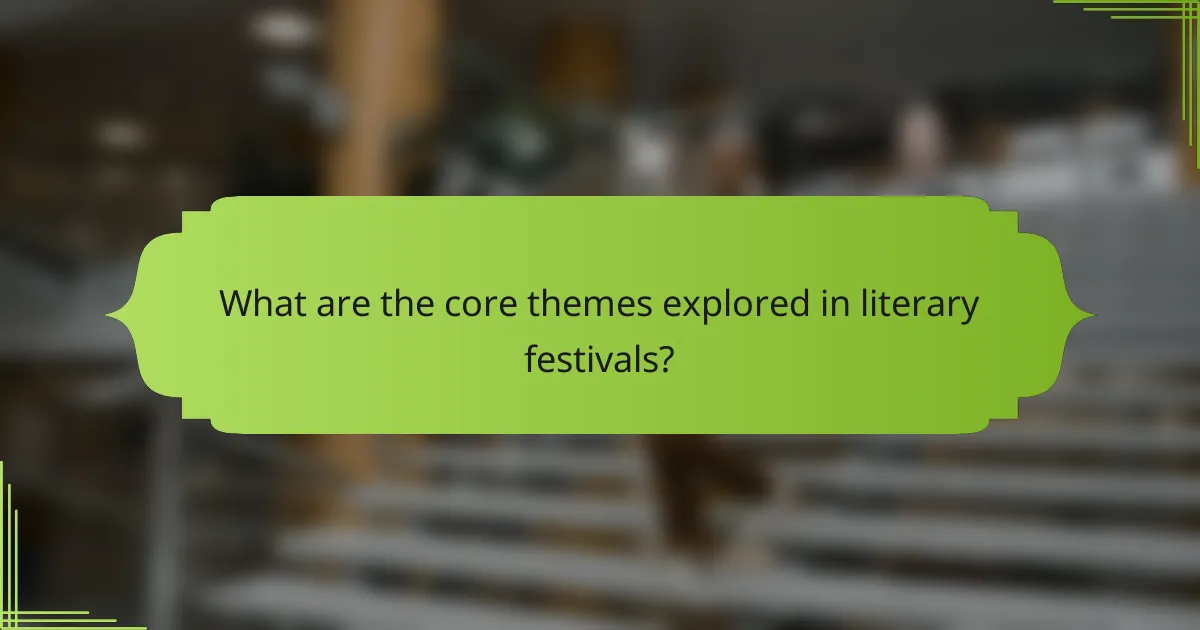
What are the core themes explored in literary festivals?
Literary festivals explore themes such as diversity, cultural expression, and genre celebration. These events emphasize storytelling, community engagement, and the promotion of emerging voices. Festivals often showcase unique attributes like interactive workshops and panel discussions, enhancing the literary experience. Additionally, they provide platforms for rare genres, fostering appreciation for niche literary forms.
How do genres influence festival programming?
Genres significantly shape festival programming by guiding the selection of themes, authors, and activities. Each genre attracts specific audiences, influencing marketing strategies and partnerships. For instance, a fantasy festival may feature immersive experiences, while a poetry festival emphasizes spoken word performances. This diversity enriches the literary landscape and fosters community engagement. Unique attributes of genres, such as their cultural significance, further enhance the festival experience, creating tailored environments that resonate with attendees.
Why are themed festivals important for literary culture?
Themed festivals are crucial for literary culture as they foster community engagement and celebrate diverse genres. These events provide platforms for authors and readers to connect, share ideas, and promote literary appreciation. Festivals often feature workshops, readings, and panel discussions, enhancing cultural dialogue and creativity. They also highlight unique attributes of genres, such as the immersive experience of fantasy or the emotional depth of literary fiction, enriching the literary landscape. As a result, themed festivals help sustain and evolve literary traditions in society.
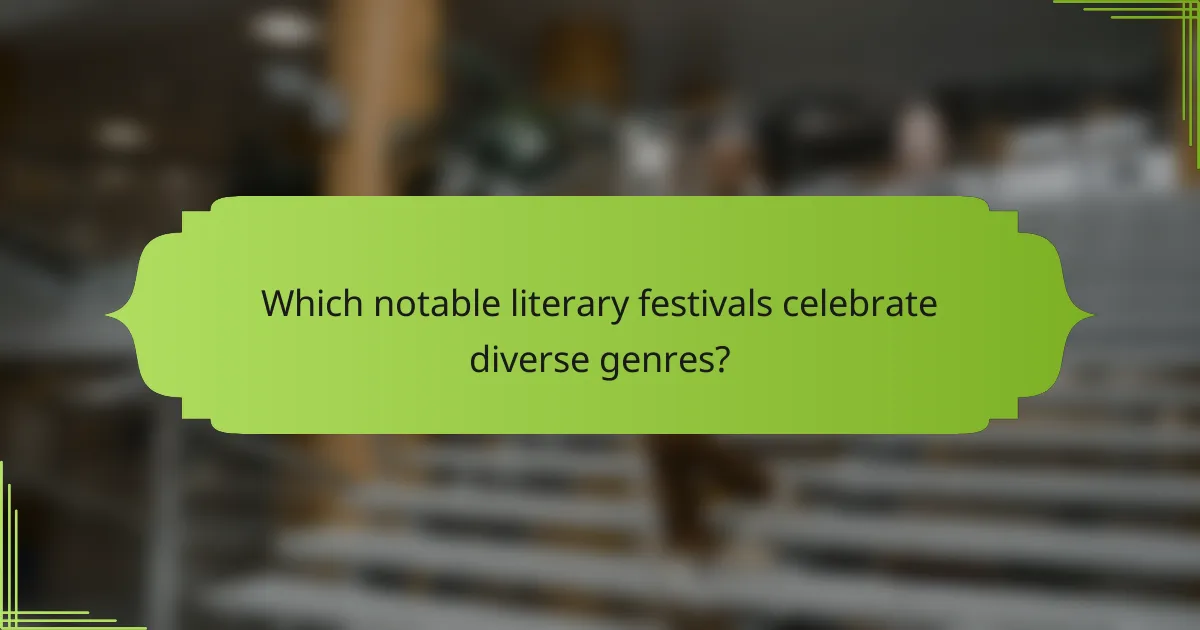
Which notable literary festivals celebrate diverse genres?
Notable literary festivals that celebrate diverse genres include the Edinburgh International Book Festival, the Brooklyn Book Festival, and the Hay Festival. These events showcase a variety of literary forms, from fiction to poetry and non-fiction. The Edinburgh International Book Festival features over 800 events, attracting authors worldwide. The Brooklyn Book Festival emphasizes independent literature, highlighting diverse voices. The Hay Festival is known for its interdisciplinary approach, merging literature with art and science. Each festival uniquely contributes to the literary landscape by promoting inclusivity and cultural exchange.
What makes the Edinburgh International Book Festival unique?
The Edinburgh International Book Festival is unique due to its focus on diverse literary voices and genres. It fosters dialogue among authors, readers, and thinkers, creating an inclusive environment. The festival features over 800 events, highlighting both emerging and established writers. Its location in the historic city of Edinburgh enhances the experience, making literature accessible in a vibrant cultural setting. Additionally, the festival promotes various forms of storytelling, from poetry to graphic novels, appealing to a wide audience.
How does the Brooklyn Book Festival showcase genre diversity?
The Brooklyn Book Festival highlights genre diversity through curated panels, author discussions, and themed events. It features a wide range of genres, from fiction to poetry, showcasing both established and emerging voices. This festival emphasizes inclusivity by representing various cultural backgrounds and literary styles. The event fosters connections among readers, writers, and publishers, creating a vibrant space for exploring diverse narratives.
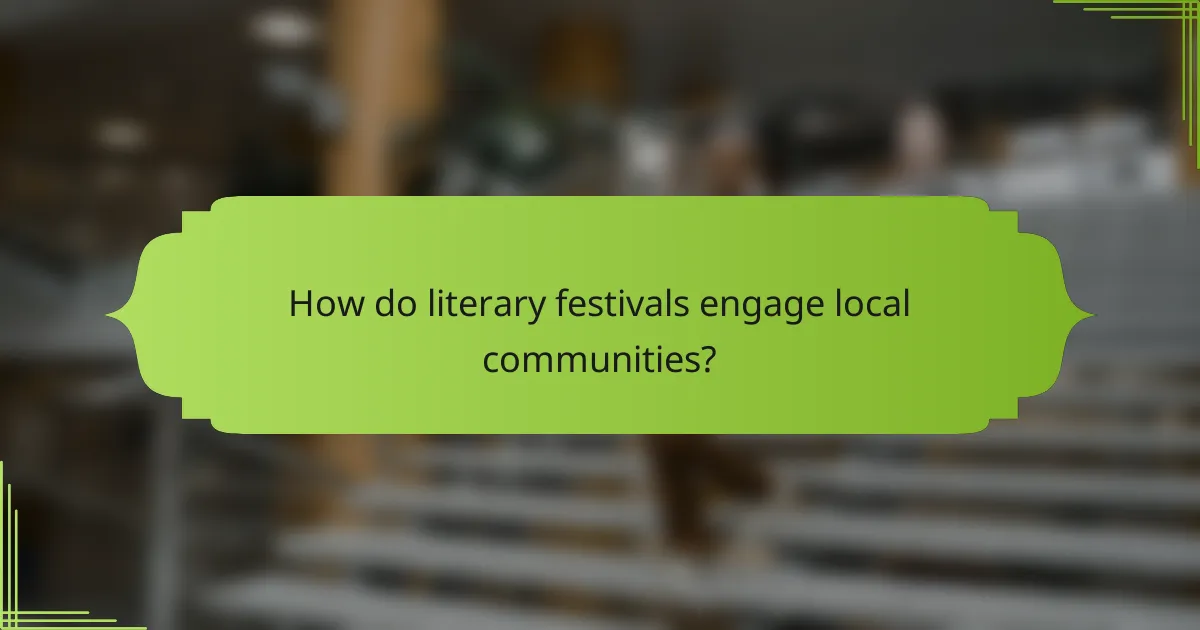
How do literary festivals engage local communities?
Literary festivals engage local communities by fostering connections through shared interests in literature. They provide platforms for local authors, promote cultural exchange, and encourage participation in workshops and discussions. These events often highlight unique regional stories, enhancing community pride and identity. Additionally, literary festivals can stimulate local economies by attracting visitors and supporting local businesses.
What role do workshops play in enhancing festival experiences?
Workshops significantly enhance festival experiences by providing interactive learning opportunities. They allow participants to engage directly with authors, fostering a deeper connection to the literary themes presented. This engagement often leads to increased appreciation for diverse genres. Additionally, workshops can cater to various skill levels, making literature accessible to a broader audience. For instance, hands-on sessions on writing techniques or genre exploration can inspire creativity and encourage participation in the literary community.
How do festivals promote emerging authors?
Festivals promote emerging authors by providing them visibility and networking opportunities. These events showcase diverse genres, allowing new writers to connect with readers and industry professionals. Festivals often feature panels, workshops, and readings, enhancing authors’ exposure. This environment fosters collaboration and mentorship, crucial for career growth. Emerging authors gain valuable feedback and insights, helping them refine their craft and build an audience.
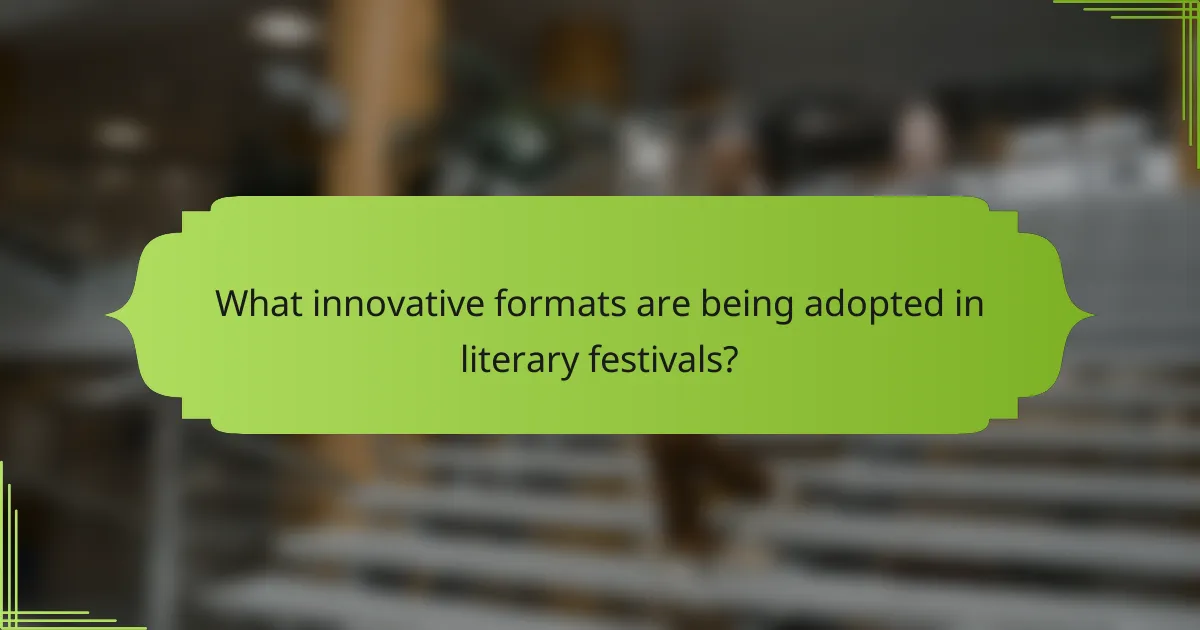
What innovative formats are being adopted in literary festivals?
Literary festivals are adopting innovative formats like virtual reality experiences, interactive workshops, and immersive storytelling sessions. These formats enhance audience engagement and diversify genre representation. For example, festivals now incorporate multimedia presentations to showcase authors and their works, creating a dynamic atmosphere. Additionally, hybrid events combine in-person and online participation, broadening accessibility and reach.
How are virtual events changing the landscape of literary festivals?
Virtual events are transforming literary festivals by enhancing accessibility and engagement. These digital platforms allow diverse audiences to participate from anywhere, breaking geographical barriers. They enable authors and readers to connect through live discussions, Q&A sessions, and interactive workshops.
Moreover, virtual formats often feature a broader range of genres and themes, catering to niche interests. This inclusivity fosters a richer literary community. As a result, festivals can attract more participants, leading to increased visibility for both emerging and established authors.
Additionally, data shows that virtual attendance can exceed traditional in-person numbers, demonstrating a shift in how literary experiences are consumed. Events can now incorporate multimedia elements, such as video readings and virtual book signings, enhancing the overall experience.
In summary, virtual events are reshaping literary festivals by promoting accessibility, diversity, and innovative engagement methods.
What are the benefits of hybrid festival models?
Hybrid festival models enhance literary journeys by combining in-person and virtual experiences. This approach increases accessibility, allowing diverse audiences to engage with various genres. It fosters a sense of community while accommodating different preferences and schedules. Furthermore, hybrid models can expand outreach, drawing in global participants and enriching discussions. By integrating technology, festivals can offer unique content, such as live-streamed author talks and interactive workshops, that may not be feasible in traditional formats.
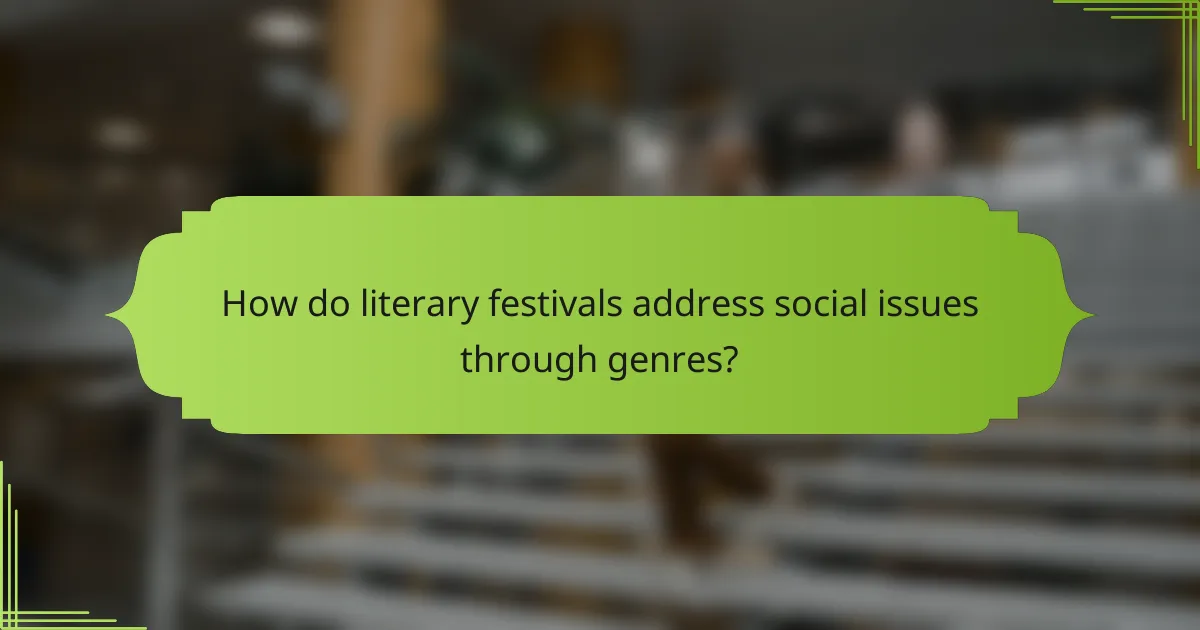
How do literary festivals address social issues through genres?
Literary festivals address social issues by showcasing diverse genres that reflect various perspectives. These events often feature panels, readings, and discussions that highlight themes such as equality, identity, and justice. For instance, festivals may include genres like memoirs that narrate personal experiences of marginalized communities, fostering understanding and empathy. Additionally, poetry slams can serve as platforms for voices advocating social change, making literature a tool for activism. By engaging audiences in these conversations, literary festivals contribute to raising awareness and prompting action on critical social issues.
What impact do they have on cultural representation?
Themed literary festivals significantly enhance cultural representation by showcasing diverse genres and voices. These events provide platforms for underrepresented authors, fostering inclusivity and broadening audience perspectives. For example, festivals often feature panels, workshops, and readings that celebrate cultural narratives, allowing attendees to engage with a variety of literary traditions. As a result, these festivals contribute to a richer cultural dialogue and promote understanding across different communities.
How do festivals foster discussions on diversity and inclusion?
Festivals foster discussions on diversity and inclusion by showcasing diverse voices and perspectives. Themed literary festivals create platforms for underrepresented authors, allowing them to share their narratives. This interaction encourages dialogue among attendees, promoting understanding and empathy. Additionally, these events often feature workshops and panels that address social issues, further enriching the conversation around diversity. Engaging with varied genres broadens participants’ horizons, making them more aware of different cultures and experiences.
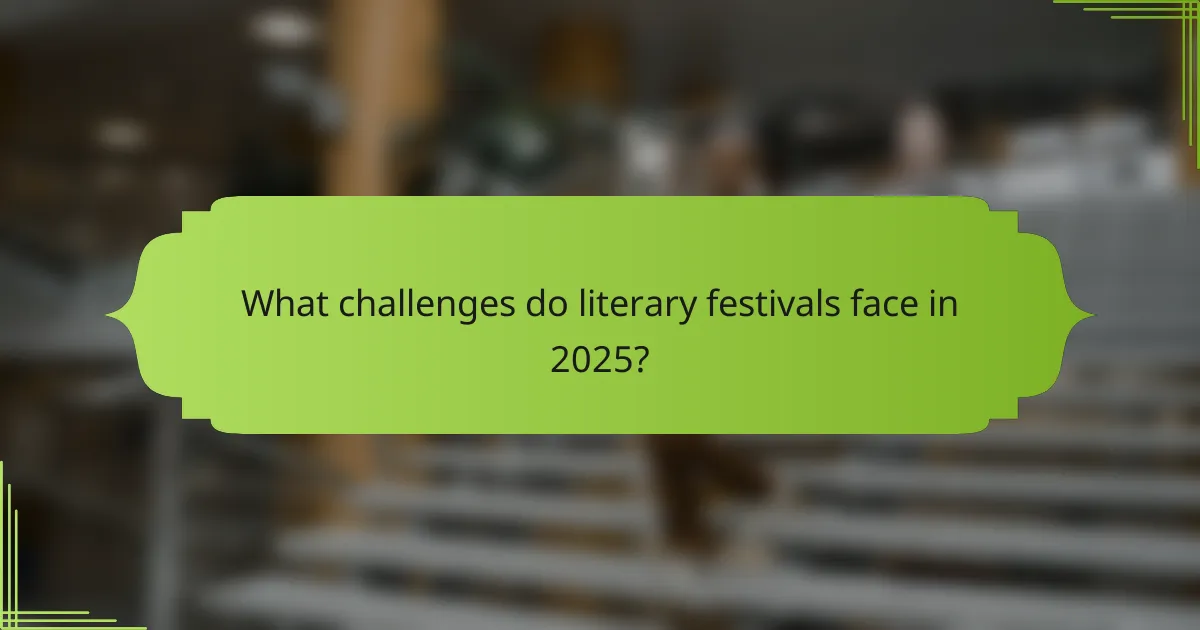
What challenges do literary festivals face in 2025?
Literary festivals in 2025 face challenges such as funding, audience engagement, and logistical complexities. As competition increases, securing sponsorship becomes vital. Diverse programming is essential to attract varied audiences, yet it complicates planning. Additionally, adapting to digital formats while maintaining in-person experiences poses significant hurdles for organizers.
How can festivals adapt to changing audience preferences?
Festivals can adapt to changing audience preferences by diversifying themes and genres. Incorporating interactive elements enhances engagement, catering to diverse interests. Data shows that themed literary festivals focusing on specific genres attract niche audiences. For example, festivals celebrating fantasy or poetry can draw dedicated fans. Utilizing social media for real-time feedback helps organizers adjust offerings effectively. Collaboration with local authors and influencers fosters community involvement, enriching the festival experience.
What are the financial sustainability issues for festivals?
Literary festivals face several financial sustainability issues. These include fluctuating attendance, reliance on sponsorships, and high operational costs. Festivals often struggle to secure consistent funding, making financial planning challenging. Additionally, competition among events can dilute audience interest and impact ticket sales.
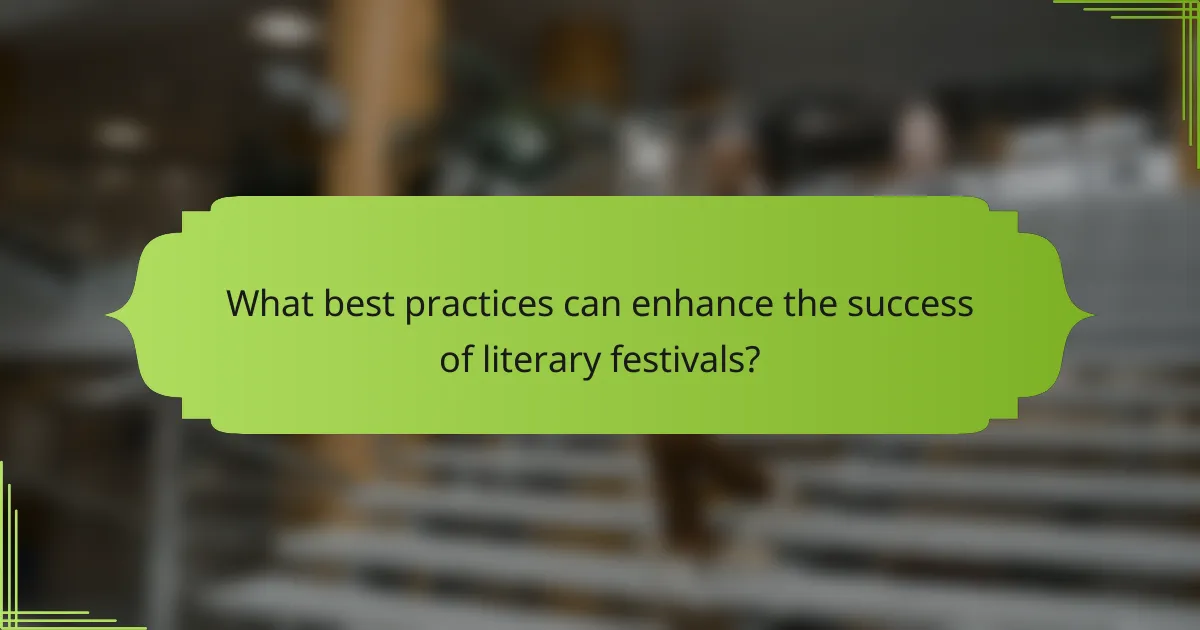
What best practices can enhance the success of literary festivals?
Engaging diverse audiences through curated themes enhances literary festival success. Incorporating interactive workshops fosters participation and deepens the literary experience. Collaborating with local authors and artists enriches the festival’s cultural relevance. Utilizing social media for promotion increases visibility and audience engagement. Offering a variety of genres attracts broader demographics, making the event inclusive and dynamic.
How can organizers effectively market themed festivals?
Organizers can effectively market themed literary festivals by leveraging targeted strategies. Focus on building a strong online presence through social media and engaging content that resonates with diverse literary genres. Collaborate with local authors and influencers to amplify reach and create buzz.
Utilize email marketing to inform potential attendees about festival highlights, schedules, and featured authors. Offer early bird ticket discounts to incentivize early purchases.
Create partnerships with local businesses to enhance the festival experience and provide mutual promotional opportunities. Highlight unique attributes of the festival, such as interactive workshops or exclusive book signings, to attract a wider audience.
Incorporate community engagement through contests or themed events leading up to the festival, fostering anticipation and involvement.
What strategies help in building partnerships with authors and sponsors?
Building partnerships with authors and sponsors requires strategic engagement and mutual benefit. Start by identifying shared goals that align with the festival’s vision. Foster open communication to understand each party’s expectations.
Leverage social media to promote collaborations and showcase authors’ works. Offer sponsorship packages that highlight unique attributes of the festival, such as audience reach and genre diversity.
Create networking opportunities during the festival to facilitate direct interactions. Follow up post-event to maintain relationships, ensuring ongoing collaboration for future festivals.